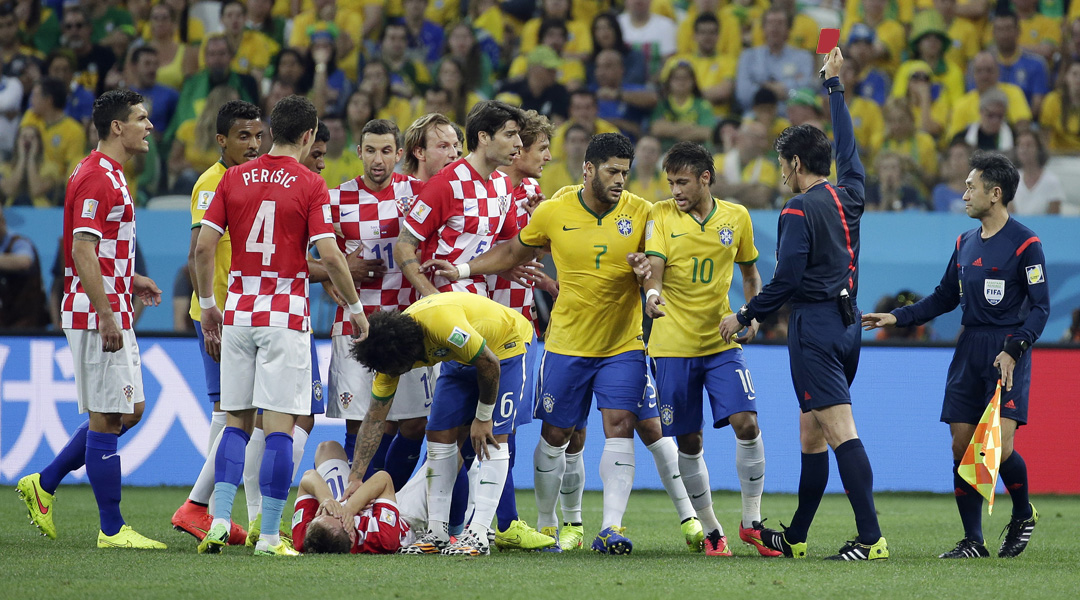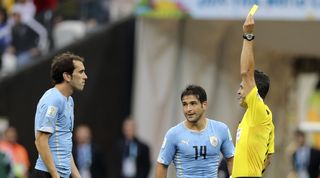The Last 16 of Justice: How the World Cup would look if the refs had got the big calls right
FFT's resident conspiracy thoerist, Nick Harper, calculates exactly how the 2014 World Cup group stages would and should have panned out had the men in black been on the money. The sound you can hear is straws being clutched...

Sixteen days and 48 matches after the 20th World Cup finals began with Jennifer Lopez and some giant dancing trees, the finest 32 teams on the planet have been whittled down to 16.
Are these now the 16 greatest teams on the planet? Has the cream risen to the top and natural footballing selection had its way? Some would say yes, but we would suggest not.
We would suggest that if the referees in certain games had spent a little longer studying their rule books and a little less time squirting foam on footballers' feet, then we would now be looking at a different last 16.
The referees have, by and large, impressed this tournament, allowing the games to flow and being cautious with their cards, under orders from Fifa. But they have still allowed one or two key decisions to go the wrong way. Decisions that have shaped how the groups finished up and defined which nations would reach the last 16.
Consider the groups and consider the evidence. (But be warned, the following contains both rampant speculation and wild hypotheses.)
Group A
A prime example of why things haven't quite worked out how they should have. Rewind back to the start of the tournament - the night Brazil, the hosts, hosted Croatia, who were not the hosts.
Get FourFourTwo Newsletter
The best features, fun and footballing quizzes, straight to your inbox every week.
Now history will forever state that Brazil won that opening game 3-1, but it shouldn't. Had Neymar been dismissed for sticking his spindly elbow into Luka Modric's throat, he wouldn't have been on the pitch to score Brazil's equaliser. Had lumbering conman Fred not been awarded a penalty for his preposterous dive, Brazil would not have been awarded the penalty from which they went ahead. And Neymar would not have scored it because he wouldn't have been on the pitch.
And on top of that, had the Japanese referee Yuichi Nishimura not denied Croatia a perfectly acceptable equaliser for an infringement on the goalkeeper that only he witnessed, then the outcome would have been very different.
Brazil would not have won. At best they would have scrambled a fortunate draw, but down to 10 men and deprived of their only real spark in Neymar, a defeat would have been far more likely an outcome. And if Brazil had lost their opening game, they quite probably would not now be preparing to face Chile as Group A winners.

Because if Brazil had lost their opening game, it's easy to imagine the pressure of playing catch up would have proven too much for the hosts, particularly given the insane levels of expectation surrounding their every step. We'd suggest they would have still taken a point from Mexico in the second game, even without the suspended Neymar, and then beaten the Group A whipping boys Cameroon to finish on four points. But Croatia would have finished on at least six, having beaten Cameroon just as comfortably as they did in 'real life' (4-0), so they would have taken top spot, two points better off than Brazil.
But here's their problem. Mexico beat Cameroon fairly, then drew with Brazil and would have fancied their chances of beating Croatia to top the group on seven points, as they did in real life. Had those results occurred, the hosts would have been out. But, well, let's be honest: the hosts never go out out in the first round.
Only once in 19 tournaments has that happened, and that was in the last World Cup, when South Africa fell at the very first hurdle. So given that 18 previous hosts have at least progressed past the first stage, it's not hard to imagine that if Brazil had lost the first game, they would have enjoyed, shall we say, a few friendly decisions going there way. We don't mean illegal favours, of course, just the type of nice decisions that helped South Korea reach the semi-finals in 2002. A questionable penalty here, a fortuitously disallowed goal there, some laxatives in the opposition oranges, that kind of thing.
We suggest Brazil would never have gone out, because that would have ruined the party. But if they'd lost that opening game they would have struggled to catch Croatia up. The hosts survived but would now be facing a tougher last 16 game.
And don't fret, not every group is as complicated and speculative as this.
Group B
The only debatable decision from Group B that we can recall was the award of that penalty for holders Spain against Holland. It wasn't a proper penalty, as Diego Costa left his leg in like the giant ham he is, so we scrub that from the books and Spain lost 5-0 instead of 5-1. Oh the horror! Obviously this made no difference to the final outcome. Holland and Chile still progressed, as Spain fell foul of that other unspoken rule of most World Cups: While the host must remain, the holder can very easily fall at the first.
Group C
Colombia qualified top with a blemish- and controversy-free nine-point haul that owed nothing to refereeing errors and everything to their quick-witted, fleet-footed and cold-eyed approach to the game. So well done them. But – and it's a sizeable But – if Giorgos Samaras wasn't tripped at all in the group decider with Ivory Coast, if he actually clipped his own heel and then fell, then we shall scrub that result and call it a draw. Which obviously means Ivory Coast go through in second place and Greece go home.
Group D
Right, well, OK. This might take some explaining.
Costa Rica would still have won Group D, their place in the last 16 is safe and was earned through honest toil and a masterful game plan. Second place would be wide open though, if the referees had refereed competently. So here goes.
England would still have been beaten by Italy in their opening game, for that passed off without any heinous errors. But in the game against Uruguay, Diego Godin deserved a straight red for the blatant clothesline on Daniel Sturridge while the score was still 0-0. Even a yellow would have produced a red as Godin had already been booked for biffing the ball away with his hand earlier in the game.

England should have beaten 11 men, so against 10 (or 9.5 given Suarez's fitness), you'd have to think they would have eventually made their numerical advantage count. If they'd won, they would have been on three points, alongside Italy (who lost the following night to Costa Rica with no real refereeing drama). Uruguay would have been pointless.
And against a Costa Rica who were as good as qualified, a full-strength England would have taken at least one of the many chances they created to win that game too, even if only by a single goal. Six points and a goal difference of +1 would have been enough to send this imaginary version of England through in second place behind the Ticos of Costa Rica.
Yes, Italy could still have taken six points themselves had they beaten Uruguay in the other final game, but in the real game they couldn't find a breakthrough and we're not prepared to believe they would do here either. You could argue that the loss of Diego Godin through suspension would have helped Italy's cause, but these are our rules. So there.
In a fair and just world, all of the above would have definitely happened and England would not be back home. Definitely.
Group E
There was nothing much untoward to report in Group E. We could suggest the referee add Karim Benzema's final goal against Switzerland back on, instead of coming over all Clive Thomas about it, but that game would have finished 6-2 not 5-2 and so doesn't much matter. France and Switzerland both still progressed to the last 16.
Group F
This one was complicated.
In reality, Argentina went through at a canter, beating Bosnia-Herzegovina in the first game, Iran in the second and Nigeria in the third for a perfect return. But if the referee had correctly penalised Pablo Zabaleta in that second game for a lazy lunge on Ashkan Dejagah, Iran would have had a penalty at 0-0. If they'd scored, we may not have witnessed Lionel Messi's late wonder goal – the pressure of being behind to Iran would have been all too much even for Messi, who would shank his shot hopelessly wide of the post. Alright, he is Lionel Messi so he'd still have scored, but that would have made it 1-1, honours even.
In truth it wouldn't actually have mattered that much really, because Argentina were too powerful in the end and accumulated enough points to get them legitimately through the group. The other teams are far more open to review. Take Nigeria, for example, who qualified behind Argentina for the last 16. The Super Eagles had a goal wrongly chalked off against Iran in their opening match that would have won the game and given them three points. That would have put them top of the table with Argentina after the first round of games, as Messi and co. had beaten Bosnia in game one.

After the second games, Argentina had four points, courtesy of that late Messi equaliser against Iran, as did Nigeria – their 1-0 win over Bosnia became a 1-1 draw when the referee and his assistant, two confused Kiwis, reconsidered Edin Dzeko's goal and realised it was good and should stand.
So, after two games, Argentina and Nigeria were still top, on four points, while Iran and Bosnia both had a single point.
But then, in the final round of games, the Argentinians duly dispatched Nigeria to top the group on seven points, and Bosnia's defeat of Iran saw them leapfrog the Africans into second place on goal difference. An historic moment, then, in this crazy hypothetical world of ours.
Group G
Everything here hangs on the frankly preposterous notion that, had Portugal been awarded that stonewall penalty against Germany in their first game, things here may have worked out differently. The fact Portugal were already 3-0 behind, down to 10 men and being carved open at will when that penalty claim came kind of urinates on our hopes of igniting this as a credible argument. No further controversies means the group finished as it finished, with Germany top, USA second and Ghana and Portugal on their way home.
Group H
To be entirely honest, a few contentious decisions would have made Group H a damn sight more interesting. Algeria's strong penalty claims against South Korea would have not changed the outcome of the game, a 4-2 win in the group's only great encounter that might have ended 5-2. Thereafter, it was by the book. Belgium failed to impress yet still won all three games, Algeria qualified in second.
All of which makes our alternative last 16 look slightly different in a few places...
The Revised Last 16
Here's how it should look, if justice had been applied, new additions in bold...
Croatia v Chile
Colombia v England
France v Bosnia-Herzegovina
Holland v Brazil
Costa Rica v Ivory Coast
Germany v Algeria
Argentina v Switzerland
Belgium v USA
Holland-Brazil? Colombia-England? A first appearance in the last 16 for Bosnia-Herzegovina? Perhaps we're biased, but this looks like a far more realistic last 16 than the one we will actually witness.
Mr Blatter please, can you not switch things around a bit and go with this one instead?
